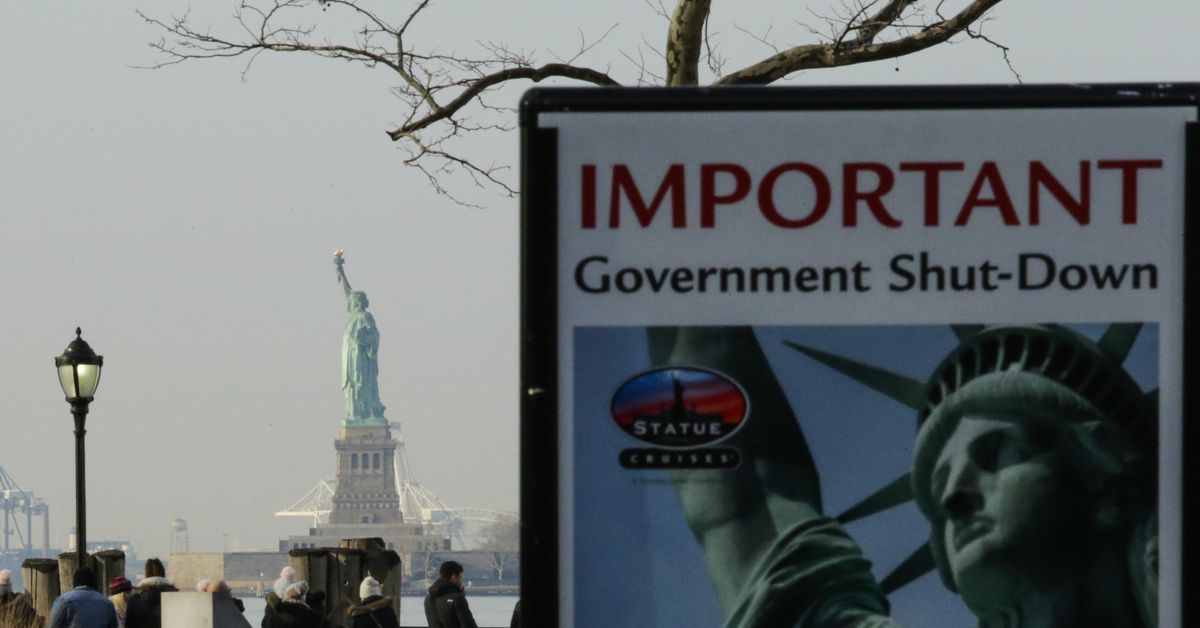So it’s come to this: The US is facing another government shutdown.
Unless the GOP-run House passes stopgap funding before Sunday, the federal government will stop paying millions of workers and military servicemembers. Some services, like parks, will stop entirely, while other federal employees will simply be expected to work without pay.
Government shutdowns used to be reasonably rare — there were zero under George W. Bush, and only one under Obama — but seem to be getting more common. Two occurred under Donald Trump’s administration, the second of which was the longest in modern American history, spanning over a month.
It doesn’t have to be like this; the whims of House Speaker Kevin McCarthy and the Republican Party’s hard-core members don’t have to determine whether federal workers get paid or not. Instead, we could eliminate shutdowns altogether using something called an automatic CR.
Usually, when the federal government shuts down or is on the verge of shutting down, the issue is resolved in the short term by passing a “continuing resolution” (or CR): a bill saying, basically, that the government should stay the course and keep spending what it’s been spending, maybe give or take a few minor tweaks. In the average year, CRs fund the government for 137 out of 365 days.
By extension, we could eliminate government shutdowns forever by enacting an automatic CR: a law that says that in the event that Congress fails to authorize funding for the government, things will just keep going along the way they’ve been.
This isn’t a purely hypothetical idea. In September 2013, just as the government was about to shut down, Congress passed and President Barack Obama signed an automatic CR that applied only to the US military. It was called the Pay Our Military Act, and it enabled the Defense Department to largely, though not entirely, avoid the worker furloughs and other cutbacks necessitated by the 2013 shutdown. The act applied only to that fiscal year, and some congressional Democrats have since called for it to be revived.
If we want to eliminate furloughs entirely, and avoid semi-regularly throwing the personal finances of hundreds of thousands, if not millions, of government workers into turmoil, as well as the sundry other costs of government shutdowns, we should consider passing a permanent automatic CR that applies to the whole government, not just the military. Sen. Mark Warner (D-VA) already has a bill that would do this, fittingly titled the Stop STUPIDITY Act.
Shutdowns are a totally optional part of American government, just like disputes over increasing the debt ceiling. Eliminating the debt ceiling to avoid calamitous legislative showdowns over spending is a no-brainer. If done well, an automatic CR is worth adopting as well.
The pros and cons of eliminating shutdowns
Government shutdowns are bad.
They’re not “throw the entire global financial system into turmoil and risk a worldwide depression” bad, the way that debt ceiling fights are. But they’re bad. They require hundreds of thousands of workers to either lose work or work without pay until Congress gets its act together. Affected contractors are not always made whole.
The 2013 shutdown, according to the Office on Management and Budget, hurt economic growth and job creation and cost the federal budget in the low billions of dollars. The 2018-19 shutdown resulted in $11 billion in economic losses, per the Congressional Budget Office.
Arguably the biggest harms of shutdowns are to federal workers, who typically are either furloughed or forced to work without pay during shutdowns. While it’s normal for Congress to authorize back pay, that hardly makes up for the large disruption in cash flow for federal workers.
Shutdowns turn federal civil servants, who do crucial work for modest pay (especially under budget sequestration and the current pay freeze), into pawns in congressional politics. They, more than anybody else, bear the cost of budget brinkmanship.
An automatic CR would end that victimization. It would ensure regular, reliable payment for civil servants and avoid these periodic disruptions of federal employees’ lives.
Not every automatic CR plan would be an improvement for federal workers, of course. One plan, proposed by Sen. Rob Portman (R-OH) during the 2013 showdown, would hold spending constantly for 120 days but then cut federal appropriations by 1 percent every 90 days thereafter. Barring active congressional intervention, this would cut trillions from the federal budget over time, and liberal budget watchdogs like the Center on Budget and Policy Priorities quite correctly opposed the idea. It would make federal employees worse off by leaving the federal government with fewer resources to compensate them, barring (unlikely) congressional action to reverse the automatic cuts.
But a proposal that regularly increased appropriations using a formula tied to inflation or economic growth, to ensure federal agencies are not starved, would not have that flaw. Even Warner’s bill, which keeps spending constant, would be an improvement. That would be an acceptable alternative to the current cycle of budget standoffs. It would keep the government running indefinitely regardless of how responsible or irresponsible Congress chooses to be.
The idea is not without its pitfalls. Most critics of automatic CRs also oppose versions of the idea without automatic cuts. They worry that eliminating the potential for shutdowns would worsen an already dysfunctional appropriations process by lowering the stakes of failure, making it harder to raise funding for specific programs and improve program efficiency in the future.
This is a real concern that has to be weighed against the costs of frequent government shutdowns. In a world where shutdowns are genuinely rare, automatic CR opponents have the better of the argument. But shutdowns appear to be growing more frequent and costly, and as tolerance of shutdowns increases, their value as a way to force new budget agreements deteriorates. As that process continues, the cost of automatic CRs, and the harm they do to the budget process, decreases.
It’s true that Congress could become neglectful of budget challenges under an automatic CR. But they have already done little to improve the miserable state of funding for non-defense discretionary programs.
It’s hard for me to imagine an automatic CR that automatically boosted spending making that problem worse. If anything, it would force conservative opponents of spending increases to the table and spur them to strike a deal reducing spending hikes in some areas in exchange for greater hikes where money is needed more.
This idea is, admittedly, somewhat fanciful when Republicans control the House, and the entire shutdown is coming about due to their demands for steep spending cuts. Speaker McCarthy is certainly likelier to endorse a Portman-esque version of this idea, which would be a step backward, than a version that automatically boosts spending. And eliminating the debt ceiling is a much more important step than eliminating shutdowns.
But given Congress’s demonstrated inability to reliably keep the government funded, we should be thinking about ways to make the process more automatic and lower the costs of congressional dysfunction. A well-designed automatic CR would help.
Republicans WANT government shutdowns.
They have become the Burn-It-All-Down party. They don’t have any actually principles.(at least none that they can talk about without their hoods on) Remember they didn’t even bother having a party platform in the last election.
They want the spectacle. They have zero empathy for all the people they are hurting. This is all about energizing the base.
If you don’t think that every single Republican wishes the insurrection had succeeded, you simply don’t understand them.
They want a Trump dictatorship. They want to own the libs. They have open plans to gut the federal government and replace all the NONPARTISAN professionals with unqualified, Trump-worshipping zombies.
A government shutdown is nothing to them. Nothing.
They’re also the “all government is bad, y’all!” party, so their intent is to do a bad job or something. They sure do like arranging for people to steal money from the government, though.
This all seems like a lot of extra work, when the easiest way to stop shutdowns is simply never elect Republicans ever again.
deleted by creator
Different budgets have been passed in both chambers, but no, a budget has not been passed. This is not a debt ceiling issue, that was months ago
We’ve only passed all 12 appropriation bills on time 4 times in the past 47 years. The last time was 1997. If a process only works less then one time out of ten that process should be replaced.
This shutdown isn’t about policy. Its about a weakling Speaker of the House.
deleted by creator
This is the best summary I could come up with:
Unless the GOP-run House passes stopgap funding before Sunday, the federal government will stop paying millions of workers and military servicemembers.
It doesn’t have to be like this; the whims of House Speaker Kevin McCarthy and the Republican Party’s hard-core members don’t have to determine whether federal workers get paid or not.
It was called the Pay Our Military Act, and it enabled the Defense Department to largely, though not entirely, avoid the worker furloughs and other cutbacks necessitated by the 2013 shutdown.
They’re not “throw the entire global financial system into turmoil and risk a worldwide depression” bad, the way that debt ceiling fights are.
This idea is, admittedly, somewhat fanciful when Republicans control the House, and the entire shutdown is coming about due to their demands for steep spending cuts.
But given Congress’s demonstrated inability to reliably keep the government funded, we should be thinking about ways to make the process more automatic and lower the costs of congressional dysfunction.
The original article contains 1,188 words, the summary contains 162 words. Saved 86%. I’m a bot and I’m open source!
Good bot!
Anyone remember 2018, Government Shutdown over the Border Wall…
Jimmy Dore talks about it:
Trump Forces Government Shut Down Over Border Wall
https://www.youtube.com/watch?v=qFdgNrmXWFQ
Comments:
you know during a gov shutdown they dont pay most military but the senators and house reps still get paid. shouldn’t they be the first to loose pay?
Kyle said it best if Democrats pushed for universal healthcare the same way Trump is pushing for the wall we would have the stronger base
Anti-Federalist 1776 Obamacare? The Dems had the Presidency, the House and the Senate for two years, and the best they could come up with with that pile of crap? Obama pulled single payer off the table so damn fast I thought he pulled a muscle. The point being made is that they (Dems) didn’t ‘fight’ for it. They bent over for the Republicans. Check your memory; it wasn’t that long ago.
Too bad Jimmy dore sucks now
Now is doing a lot of heavy lifting there.
Ah, okay.
Not all comedians are to our taste.
Who do you watch now? I am always looking for additional political people.







